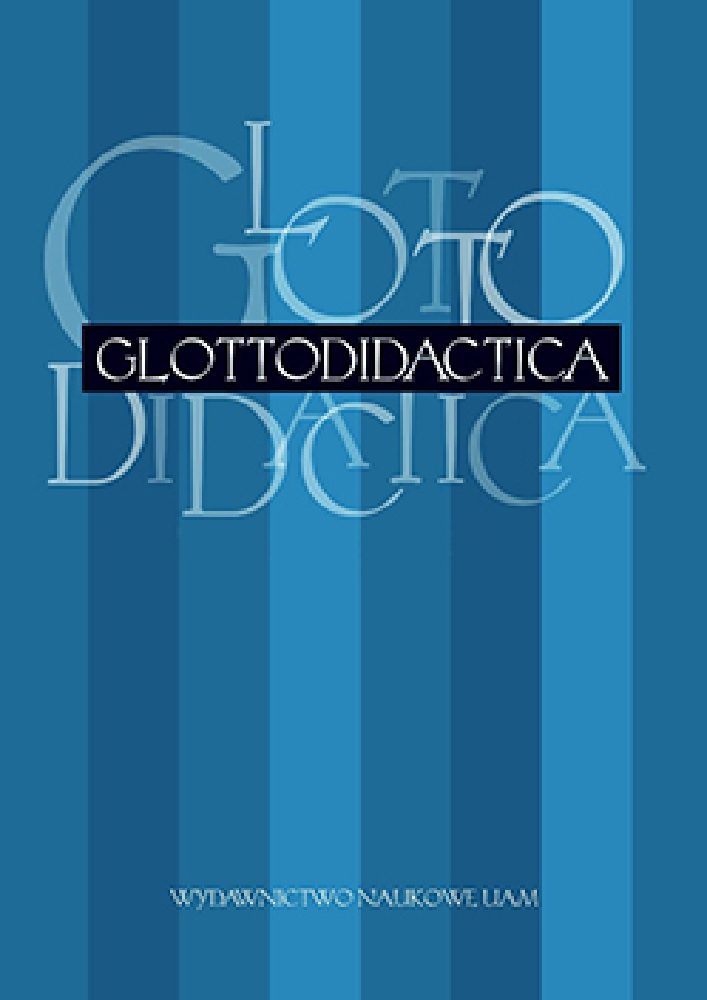Résumé
In contemporary academia, there are no mono-semantic definitions of either applied linguistics or discursive syntax. I analyse how applied linguistics is understood in Russia, Poland and Germany, and present syntax as a part of applied intercultural linguistics. The analysed data are reflective texts by Russian and German participants of the intercultural project “Rilke and Russia” that took place in 2019, in Samara. I consider these texts for reflective discourse appearing as a result of speech acts realised as self-talk. In my analyses, I use methods that are specific for speech acts research on the one hand, and that are typical of syntax on the other. So, I identify the role subjects, their intentionality and the persons addressed. Then, I compare the syntactic means used by Russian and German role subjects and show that these means are influenced by national culture and mentality.
Références
Arutiunova, N.D. (1981). Faktor adresata. Izvestija AN SSSR. Serija literatury i jazyka, 40 (4), 356–367.
Baranov, A.N. (2003). Vvedenije v prikladnuju lingvistiku. Moskwa: Editorial URSS.
Beliao, Ju. / Lachert, A. (2013). Disfluency and discursive markers: When prosody and syntax plan discourse. The 6th workshop on disfluency in spontaneous speech, at Stockholm, Sweden, 54 (1), 5–8.
Bondarko, A.V. (1991). Vopros o lice subiekta v lice objekta. In: A.V. Bondarko et al. (Hrsg.), Teorija funkcjionalnoj grammatiki. Personalnost. Zagolovnost (S. 14–19). Sankt–Petersburg: Nauka.
Cerquiglini, B. / Hoffman, C. / Pelizzari, D. / Nichols, S.G. (1986). The syntax of discursive authority: The example of feminine discourse. Yale French Studies, 70: Images of power medieval history / discourse / literature, 183–198. DOI: https://doi.org/10.2307/2929855
Dementjev, V.V. (2013). Kommunikativnyje cennosti russkoj kultury: kategoria personalnosti v leksike i pragmatike. Moskwa: Global kom.
Fiehler, R. (2015). Syntaktische Phänomene in der gesprochenen Sprache. In: Ch. Dürscheid / J. G. Schneider (Hrsg.), Handbuch Satz, Äußerung, Schema (S. 370–395). Berlin [u.a.]: De Gruyter. DOI: https://doi.org/10.1515/9783110296037-017
Foucault, M. (2002). The archeology of knowledge. New York: Routledge.
Haber, O. (2017). Wortschatzarbeit motivierend gestalten. In: O. Haber (Hrsg.), Für die Praxis. Materialien für die berufsbezogene Sprachbildung. Bd. 5. Hamburg: Fachstelle Berufsbezogenes Deutsch im Förderprogramm IQ. http://www.deutsch-am-arbeitsplatz.de/fileadmin/user_upload/PDF/10_Fachstelle/05_BS_Wortschatzarbeit_Web.pdf [Zugriff am 25.09.2020].
Karasik, V.I. (1999). Harakteristika pedagogicheskogo diskursa. In: V.I. Karasik (Hrsg.), Jazykovaja lichnost’: aspekty lingvistiki i lingvodidaktiki: Sb. nauchnykh trudov. Volgograd: Peremena.
Kaschkin, V.B. ( 2002). Bytovaja filosofija jazyka i jazykovyje kontrasty. In: V.B. Kaschkin (Hrsg.), Teoreticheskaja i prikladnaja lingvistika. Vyp. 3: Aspekty metakommunikativnoj dejatelnosti (S. 4–34). Voronez: VGTU.
Kiklewicz, A. (2011). Kategorien der interkulturellen Linguistik in systembezogener Auffassung. In: C. Földes (Hrsg.), Interkulturelle Linguistik im Aufbruch. Das Verhältnis von Theorie, Empirie und Methode (S. 59–75). Tübingen: Narr Francke Verlag.
Kostrova, O. (2011). Diskurstypen und -erscheinungsformen. In: M.L. Kotin / E.G. Kotorova (Hrsg.), Sprache in Aktion. Pragmatik. Sprechakte. Diskurs (S. 157–166). Heidelberg: Universitätsverlag Winter.
Kostrova, O.A. (1992). Prodolzhennaja sintaksicheskaja forma kak promezhutochnoje zveno mezhdu prostym predlozhenijem i sverhfrazovym jedinstvom. Avtoref. dis. dokt. filol. nauk. Moskwa: In-t jazykoznanija RAN.
Kostrova, O.A. (2004). Ekspressivnyj sintaksis sovremennogo nemeckogo jazyka. Moskwa: Flinta. MPSI.
Kostrova, O.A. (2009). Tekst i diskurs: granicy i perehody. In: N.S. Babenko (Hrsg.), Russkaja germanistika. T. VI: Granicy v jazyke, literature i nauke (S. 348–355). Moskwa: JaSK.
Kostrova, O.A. / Sobchakova N.M. (2011). Slozhnopodchinennyje predlozhenija s pridatochnymi vremeni v nemeckom i anglijskom jazykah. Samara: PGSGA.
Kotin M.L. (2011). Ik gihôrta đat seggen… Modalität, Evidentialität, Sprachwandel und das Problem der grammatischen Kategorisierung. In: G. Diewald / E. Smirnova (Hrsg.), Modalität und Evidentialität. Modality and Evidentiality (S. 35–48). Trier: Wissenschaftlicher Verl.
Kuße, H. (2011). Kulturwissenschaftliche Linguistik. In: C. Földes (Hrsg.), Interkulturelle Linguistik im Aufbruch (S. 117–136). Tübingen: Narr. DOI: https://doi.org/10.36198/9783838537450
Labov, W. (1972). The transformation of experience in narrative syntax. In: W. Labov (Hrsg.), Language in the inner city (S. 354–396). Oxford: Basil Blackwell.
Liedtke, F. (2011). Sprechakte und pragmatische Anreicherung. In: M.L. Kotin / E.G. Kotorova (Hrsg.), Sprache in Aktion (S. 131–144). Heidelberg: Universitätsverlag Winter.
Myczko, K. (2010). Reflexion als Schlüsselphänomen der gegenwärtigen Fremdsprachendidaktik. Frankfurt a. M.: Peter Lang.
Prokop, I. (2020). Einige sprechakttheoretische Überlegungen zur Kommunikation im Unterricht (Manuskript. Zu erscheinen in der Festschrift für Prof. Dr. Kazimiera Myczko 2020) [im Druck].
Serl, J.-P. (1987). Priroda intencionalnyh sostojanij. In: V.V. Petrova (Hrsg.), Filosofija, logika, jazyk. Moskwa: Progres. https://Texas/filosofija – ucebnik – besplatno/ djon –serl-priroda. Intensionalnyih-18262.html [Zugriff am 25.09.2020].
Sternin, I.A. (2002). Nemeckij jazyk v russkom kommunikativnom soznanii. In: V.B. Kaschkin (Hrsg.), Teoreticheskaja i prikladnaja lingvistika. Vyp. 3: Aspekty metakommunikativnoj dejatelnosti (S. 114–119). Voronezh: VGTU.
Tiukow, A.A. (1987). O putiach opisanija psichołogiczeskich miechanizmow riefleksii. In: I.S. Ładienko (Hrsg.), Problemy riefleksii: Sowriemiennyje kompleksnyje issledowanija (S. 68–75). Nowosibirsk: Nauka.
Licence
© Olga Kostrova 2020

Ce travail est disponible sous licence Creative Commons Attribution - Pas de Modification 4.0 International.
Auteurs
Les auteurs de textes acceptés pour publication dans la revue Glottodidactica sont tenus de remplir, signer et renvoyer à l'adresse de la rédaction, un accord sur l'octroi d'une licence gratuite pour les œuvres, avec obligation d'accorder une sous-licence CC.
Conformément à cet accord, les auteurs des textes publiés dans la revue Glottodidactica accordent à l'Université Adam Mickiewicz de Poznań une licence non exclusive et gratuite et autorisent l'utilisation de la sous-licence Creative Commons Attribution-NoDerivatives 4.0 International (CC BY-ND 4.0).
Les auteurs se réservent le droit de disposer librement de l'œuvre.
Utilisateurs
Les utilisateurs d'Internet intéressés ont le droit d'utiliser les œuvres publiées dans la revue Glottodidactica depuis 2016, selon les conditions suivantes :
- Attribution – obligation de fournir, conjointement avec l'œuvre distribuée, des informations sur l'auteur, le titre, la source (lien vers l'œuvre originale, DOI) et la licence elle-même.
- Aucune modification – l'œuvre doit être préservée dans sa forme originale. Sans le consentement de l'auteur, il n'est pas possible de distribuer l'œuvre modifiée sous forme de traductions, publications, etc.
Les droits d'auteur sont réservés pour tous les textes publiés avant 2016.
Autres
L'Université Adam Mickiewicz de Poznań conserve les droits sur la revue dans son ensemble (mise en page, forme graphique, titre, conception de la couverture, logo, etc.).
A PARTIR DE L’ANNEE 2015, LES ARTICLES PUBLIÉS DANS LA REVUE SONT DISPONIBLES SOUS LICENCE CREATIVE COMMONS : https://creativecommons.org/licenses/by-nd/4.0/deed.fr





